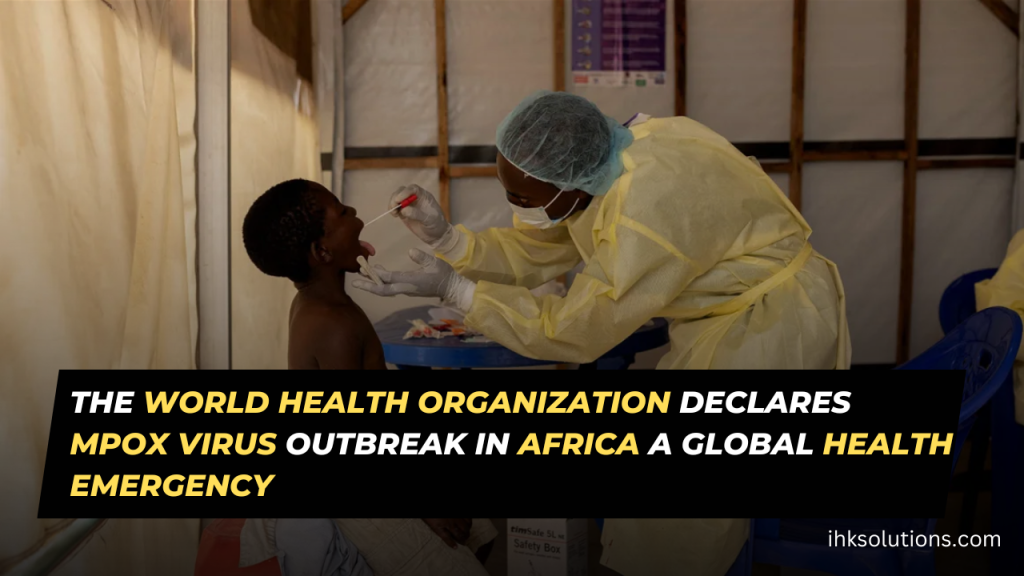The World Health Organization (WHO) on Wednesday declared the outbreak of the Mpox virus in Africa a global health emergency.
The WHO convened an emergency committee amid concerns that a more deadly strain of the virus, Type I, has reached four previously unaffected countries in Africa. This strain had been contained in the Democratic Republic of the Congo.
Independent experts met virtually on Wednesday to advise WHO Director-General Tedros Adhanom Ghebreyesus on the severity of the outbreak. Following their consultation, he announced that a Public Health Emergency of International Concern (PHEIC) had been declared—this is the highest level of alert under international health regulations.
He stated, “The rapid detection and spread of a new strain of Mpox in eastern Democratic Republic of the Congo, its detection in neighboring countries that have not previously reported Mpox, and the potential for its spread within and beyond Africa is very concerning.”
“The emergency committee has informed me that the situation constitutes a public health emergency of international concern. I have accepted this advice.”
A PHEIC is a designation given by WHO to “extraordinary events” that pose a risk to other countries through the international spread of disease. Such outbreaks may require a coordinated international response, according to the organization.
The head of the committee, Demy Ogoina, said, “There was a consensus that the current Mpox outbreak, and the increasing number of cases, is an extraordinary event.” He added, “What’s happening in Africa is only the beginning; there’s much more beneath the surface. We do not fully understand, nor do we have the complete picture, of the burden of Mpox.”
On Tuesday, the Africa Centres for Disease Control and Prevention (Africa CDC) announced that the outbreak constitutes a public health emergency of continental concern, marking the first such declaration by the agency since its establishment in 2017.
Since the beginning of the year, more than 17,000 Mpox cases and over 500 deaths have been reported in 13 countries in Africa, according to Africa CDC, which classifies the outbreak as a “high-risk event.” The highest number of cases—over 14,000—have been in the Democratic Republic of the Congo, which reported 96% of confirmed cases this month.
Mpox, formerly known as monkeypox, is a viral disease that can spread easily among people and from infected animals. It can spread through close contact, such as touching, kissing, or sexual activity, as well as through contaminated materials like bedding, clothing, and needles, according to WHO. Symptoms include fever, a painful rash, headaches, muscle and back pain, low energy, and swollen lymph nodes.
For decades, the disease was largely found in Central and West Africa, but it also began spreading in Europe and North America in 2022. WHO had previously declared the spread of Mpox a global health emergency in July 2022 and ended this declaration in May 2023.
Mpox is classified into two distinct genetic groups, known as Clade I and Clade II. A clade is a broad group of viruses that have evolved over decades and are genetically and clinically distinct. Clade II was responsible for the outbreak in 2022, but Clade I can cause more severe illness.
Tedros explained, “But we are not dealing with just one outbreak of a single clade; we are facing multiple outbreaks of different clades in different countries with different modes of transmission and varying levels of risk.”
No cases of Clade I Mpox have been identified in the United States, according to the U.S. Centers for Disease Control and Prevention (CDC), but they are monitoring the situation. The U.S. government has offered funding, assistance, and vaccines to WHO and the Democratic Republic of the Congo to support efforts in Africa.
Last week, the CDC recommended that people in the U.S. who are at risk or potentially exposed to the Mpox virus be vaccinated.
WHO officials said last week that the virus can be contained “quite directly if we do the right things at the right time.” They also called for international cooperation in funding and organizing efforts to suppress the outbreak and support research to better understand Clade I and its spread.
On Wednesday, Tedros stated, “It’s evident that we need a unified global effort to halt these outbreaks and protect lives.”
The organization has approved an emergency use listing for two Mpox vaccines and has developed a regional response plan requiring $15 million, with $1.5 million already released from WHO’s emergency fund.
According to Tim Nguyen from WHO’s Health Emergencies Programme, half a million doses of the vaccine are in stock, and an additional 2.4 million doses could be produced by the end of the year. Dr. Abdou Salam Gueye, WHO’s Regional Emergency Director for Africa, added that the Democratic Republic of the Congo and Nigeria will be the first to receive these vaccines.
WHO emphasized that vaccines are only part of the response; containing the spread will also require increased surveillance, diagnostics, and research to fill “gaps in understanding.”
Dr. Maria Van Kerkhove, WHO’s Technical Lead for Epidemic and Pandemic Preparedness and Prevention, said, “We can stop the transmission of Mpox with a concerted effort using multiple approaches.”
“With so much uncertainty around, we have a unique chance right now to make the most of this time. It’s crucial that we back member states in advancing the research necessary for a deeper understanding.”

